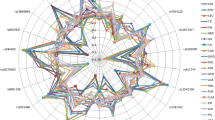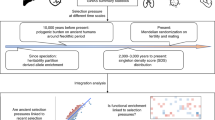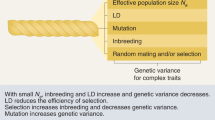Abstract
TAY-SACHS disease, caused by a recessive autosomal gene, occurs approximately a hundred times more frequently in Jews from Central Europe (Ashkenazi) than in those from the Mediterranean Basin (Sephardic). Myrianthopoulos and Aronson1 proposed that the difference in gene frequency of the two populations is a consequence of simple heterozygote advantage in the Ashkenazi. Furthermore, they stated that this advantage probably arose fifty generations ago when there was a mass exodus of Jews after the Roman conquest of Jerusalem. The present gene frequencies in the two populations were given by Myrianthopoulos and Aronson as qASH = 0.0126 and qSEPH = 0.0013. This corresponds to q2ASH = 0.000158 and q2SEPH = 0.0000017 or approximately 158 Tay-Sachs births per million among the Ashkenazi Jews and 1.7 per million among the Sephardic Jews.
This is a preview of subscription content, access via your institution
Access options
Subscribe to this journal
Receive 51 print issues and online access
$199.00 per year
only $3.90 per issue
Buy this article
- Purchase on Springer Link
- Instant access to full article PDF
Prices may be subject to local taxes which are calculated during checkout
Similar content being viewed by others
References
Myrianthopoulos, N. C., and Aronson, S. M., Amer. J. Human Genet., 18, 313 (1966).
Author information
Authors and Affiliations
Rights and permissions
About this article
Cite this article
SHAW, R., SMITH, A. Is Tay-Sachs Disease Increasing?. Nature 224, 1214–1215 (1969). https://doi.org/10.1038/2241214b0
Received:
Issue Date:
DOI: https://doi.org/10.1038/2241214b0
This article is cited by
-
Tay-sachs disease: To screen or not to screen?
Journal of Religion and Health (1976)
-
Tay-Sachs Disease is Probably not Increasing
Nature (1970)
Comments
By submitting a comment you agree to abide by our Terms and Community Guidelines. If you find something abusive or that does not comply with our terms or guidelines please flag it as inappropriate.



